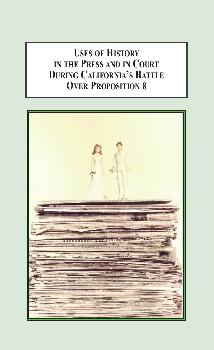THE USES OF HISTORY IN THE PRESS AND IN COURT DURING CALIFORNIA'S BATTLE OVER PROPOSITION 8: Casting Same Sex Marriage as a Civil Right
We are currently unable to ship to the EU countries at this time. We apologize for this inconvenience.

| Author: | Li, Anqi | |
| Year: | 2012 | |
| Pages: | 124 | |
| ISBN: | 0-7734-2637-X 978-0-7734-2637-5 | |
| Price: | $139.95 + shipping | |
| (Click the PayPal button to buy) | ||
Li sees through the media’s white noise on the issue of same sex marriage to discover that opponents of Proposition 8 often made claims about the past to sway public perception. These arguments were based on claims evoking a historical sense of the institution of marriage, but to a certain extent they were untrue. This book attempts to dispel some of the misperceptions around the concept of marriage in a historical context. Li also shows that homosexual and heterosexual couples are not exactly the same, and marriage is differently understood. She goes above and beyond merely explicating how the media covered the story, to delve into larger social influences at play in society.
Reviews
“She has chronicled for future researchers a breakthrough moment when new ideas and ideals of marriage crossed what Post has called ‘the porous membrane separating constitutional law from constitutional culture’… by creating a historical record of the voices of non-judicial actors.”
-Prof. Dean Smith,
University of North Carolina
“This is a much-needed analysis of the role that newspapers play in social, political, and legal dynamics about issues that have profound moral consequences.”
-Prof. Tyler Curtain,
Duke University
“Her interpretation of her findings and their implications for the field are excellent and suggest this work could have a long shelf life.”
-Prof. Barbara Friedman,
University of North Carolina
-Prof. Dean Smith,
University of North Carolina
“This is a much-needed analysis of the role that newspapers play in social, political, and legal dynamics about issues that have profound moral consequences.”
-Prof. Tyler Curtain,
Duke University
“Her interpretation of her findings and their implications for the field are excellent and suggest this work could have a long shelf life.”
-Prof. Barbara Friedman,
University of North Carolina
Table of Contents
Foreword
Chapter 1: Journalistic and Judicial Thoughts on History and Marriage
Introduction
Looking Back: Definitions and Uses of History
Processing the Past: How Narratives Emerge
Reporting the Past: History in Newspapers
Judging the Past: History in the Courts
Putting the Past to Work: Uses and Abuses of History
Moving Forward: The Rise of Marriage Discourse
Who Participated: Same-Sex Couples and Marriage
What the Law Said: Marriage Narratives in the Courts
What the Public Said: Same-Sex Couples and Marriage in Newspapers
Wrapping Up: Summary of the Literature
Chapter 2: Structure of the Study
Method
Chapter 3: Assessment of the Texts and Themes on Marriage Equality
Findings and Discussions
Research Questions and Expectations
Overarching Themes
Marriage and Religion
Marriage Only for Heterosexual Couples
Practical Benefits of Marriage Comparing Sex, Race, and Sexual Orientation
Discrimination
Comparing Marriage Transformations: Coverture and Miscegenation Resisting Analogies
Newpaper Coverage During the Trial
Marriage, Children, and Family
Marriage, Civil Rights, and Citizenship
Marriage Equality in the U.S. and Beyond
Same-Sex Couples are “Like” Heterosexual Couples
Judicial Records
Universality of “Traditional” Marriage
Marriage as Access to Social Vocabulary
Newpaper Coverage After the Trial
Marriage as a National Movement
Marriage and State Regulation
Comparing Public Opinion on Marriage Equality
Comparing Political Climate and Events
Assigning Values and Superlatives in Marriage Discourse
Chapter 4: Final Thoughts
Conclusions
Themes During and After the Trial
Overarching Themes
Limitations and Further Research Implications Bibliography Index
Chapter 1: Journalistic and Judicial Thoughts on History and Marriage
Introduction
Looking Back: Definitions and Uses of History
Processing the Past: How Narratives Emerge
Reporting the Past: History in Newspapers
Judging the Past: History in the Courts
Putting the Past to Work: Uses and Abuses of History
Moving Forward: The Rise of Marriage Discourse
Who Participated: Same-Sex Couples and Marriage
What the Law Said: Marriage Narratives in the Courts
What the Public Said: Same-Sex Couples and Marriage in Newspapers
Wrapping Up: Summary of the Literature
Chapter 2: Structure of the Study
Method
Chapter 3: Assessment of the Texts and Themes on Marriage Equality
Findings and Discussions
Research Questions and Expectations
Overarching Themes
Marriage and Religion
Marriage Only for Heterosexual Couples
Practical Benefits of Marriage Comparing Sex, Race, and Sexual Orientation
Discrimination
Comparing Marriage Transformations: Coverture and Miscegenation Resisting Analogies
Newpaper Coverage During the Trial
Marriage, Children, and Family
Marriage, Civil Rights, and Citizenship
Marriage Equality in the U.S. and Beyond
Same-Sex Couples are “Like” Heterosexual Couples
Judicial Records
Universality of “Traditional” Marriage
Marriage as Access to Social Vocabulary
Newpaper Coverage After the Trial
Marriage as a National Movement
Marriage and State Regulation
Comparing Public Opinion on Marriage Equality
Comparing Political Climate and Events
Assigning Values and Superlatives in Marriage Discourse
Chapter 4: Final Thoughts
Conclusions
Themes During and After the Trial
Overarching Themes
Limitations and Further Research Implications Bibliography Index
Other Legal Studies Books
2023 - What Went on Behind the Curtain at the Nuremberg Trials? Secrets, Forgeries, Thefts, and Deals
>> See all our Legal Studies books